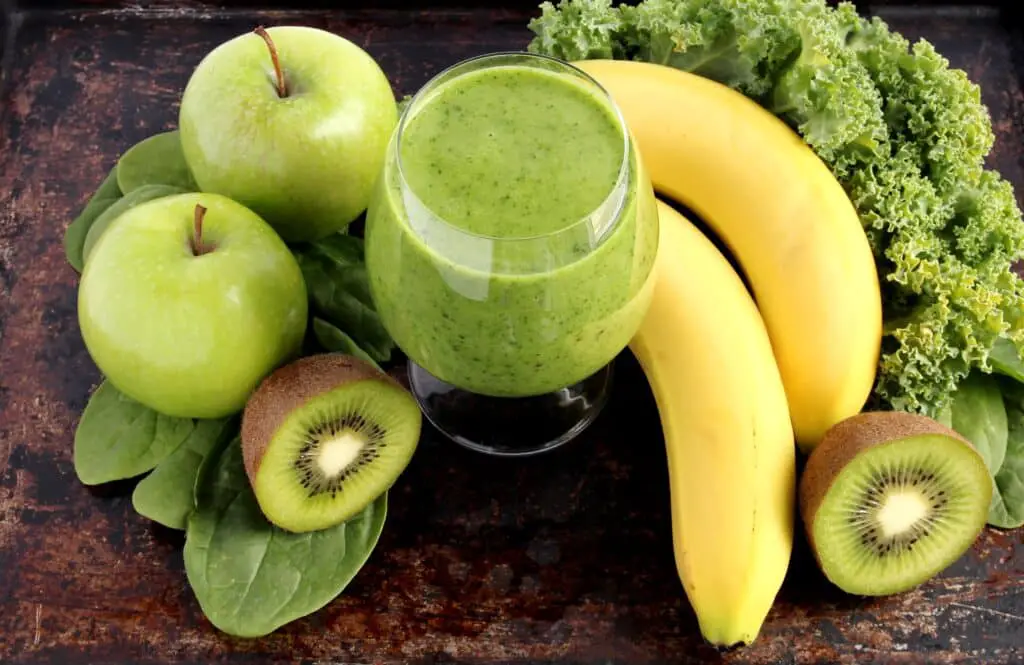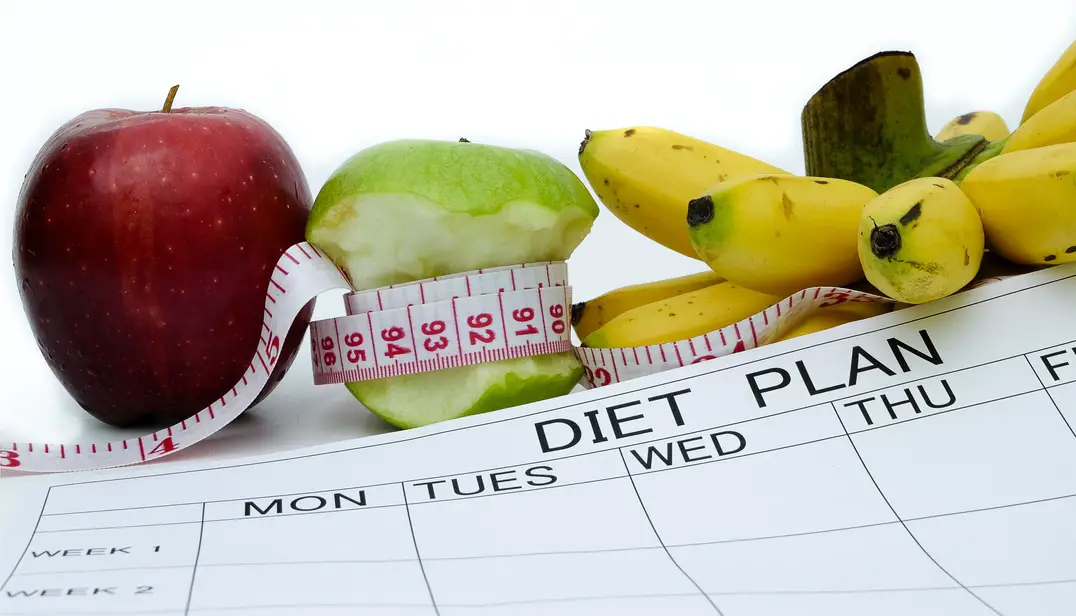Introduction
Is An Apple Or Banana Better For Weight Loss: Apples are renowned for their low-calorie content, high dietary fiber, and antioxidants. A medium-sized apple typically contains around 95 calories and is an excellent source of soluble fiber, particularly pectin. This fiber helps in controlling appetite and maintaining satiety for longer periods, potentially reducing overall calorie consumption. Moreover, apples are rich in vitamins, primarily vitamin C, and various minerals like potassium. The antioxidants in apples can combat inflammation and support overall health, which can indirectly aid in weight loss by promoting a healthy body.
Bananas, on the other hand, are slightly higher in calories compared to apples, with an average medium-sized banana containing approximately 105 calories. However, they are a good source of essential nutrients such as potassium, vitamin C, and vitamin B6. Bananas are particularly prized for their natural sugars, which provide quick energy. This can be advantageous for those engaging in physical activity as it helps sustain workouts, potentially leading to more effective calorie burning.
In the debate over apples vs. bananas for weight loss, the choice often comes down to personal preference and individual dietary needs. Both fruits have their merits, with apples being lower in calories and higher in fiber, making them a great choice for those seeking to control their appetite. Bananas, on the other hand, offer energy and a host of nutrients that can support an active lifestyle, which is also crucial for weight management.

Should I eat apples if I want to lose weight?
Apples can support weight loss for a few reasons: they are low in calories, rich in antioxidants, contain fiber and are naturally sweet, promoting satiety and helping ward off cravings for sweets. Apples alone can’t achieve weight loss, but you can support your goal by combining them with a healthy and balanced diet.
The Nutritional Value of Apples
Dietary Fiber: Apples are high in dietary fiber, specifically soluble fiber known as pectin. This fiber can help you feel fuller for longer, which may reduce your overall calorie intake.
Low in Calories: Apples are relatively low in calories, with an average medium-sized apple containing around 95 calories. This makes them a suitable snack option for those trying to control their calorie consumption.
Vitamins and Minerals: Apples contain essential vitamins and minerals, including vitamin C, vitamin A, potassium, and various B vitamins. These nutrients support overall health and well-being.
Antioxidants: Apples are rich in antioxidants, particularly quercetin, which may have various health benefits, including anti-inflammatory properties.
Apples and Weight Loss
Satiety: The fiber in apples helps promote a feeling of fullness. Eating an apple as a snack can help curb your appetite and prevent overeating during your next meal.
Low Energy Density: Apples have a low energy density, meaning they provide fewer calories per gram. This can help you consume fewer calories while still feeling satisfied.
Natural Sweetness: Apples offer a natural source of sweetness without the added sugars found in many processed snacks and desserts. This can satisfy your sweet tooth without the excess calories.
Improved Digestion: The fiber in apples can aid in digestion and prevent constipation, making it easier to maintain a healthy diet.
Do apples and bananas burn belly fat?
So, eat an apple in breakfast to get the desired tummy size. Bananas: Like apples, bananas are also rich in potassium and contain multivitamins. They are filling and help you to resist the cravings for fast food. Moreover, banana boosts the metabolic rate, thereby melting the belly fat.
Apples, Bananas, and Belly Fat
Calorie Control: Both apples and bananas can be valuable components of a weight loss plan due to their low to moderate calorie content. Managing calorie intake is essential for overall fat loss, including reducing belly fat.
Fiber for Satiety: The high fiber content in both fruits can help you feel full and satisfied, potentially reducing overall calorie consumption, which can contribute to fat loss over time.
Spot Reduction Myth: It’s important to note that no specific food, including apples and bananas, can target fat loss from a particular area of the body, such as the belly. The concept of “spot reduction” is a myth. Fat loss occurs throughout the body as a result of overall calorie expenditure exceeding calorie intake.
Balanced Diet: To effectively reduce belly fat and achieve overall fat loss, it’s crucial to maintain a balanced diet that includes a variety of foods, including lean proteins, whole grains, vegetables, and fruits like apples and bananas.
Physical Activity: Combining a healthy diet with regular physical activity, such as cardio and strength training exercises, is key to achieving and maintaining a healthy weight, including reducing belly fat.
Why do apples burn belly fat?
“Apple has good fibre content and pectin. This helps in good gut flora which in turn helps in good health and reduces chances of obesity and belly fat pileup. By delaying stomach-emptying, it slows digestion and may help you feel full for longer.
The Reality of Belly Fat Loss
Spot Reduction is a Myth: No single food, including apples, has the ability to target fat loss from a specific area of the body. The concept of “spot reduction” is not supported by scientific evidence.
Overall Calorie Balance: Fat loss occurs when the number of calories burned through daily activities and metabolic processes exceeds the number of calories consumed through food and beverages. This creates a calorie deficit, leading to fat loss throughout the body, including the belly.
Balanced Diet and Exercise: Achieving and maintaining a healthy weight, including reducing belly fat, requires a combination of factors, including a balanced diet that includes a variety of foods, regular physical activity, and a sustainable lifestyle.
Genetic Factors: Genetics play a significant role in determining where your body stores fat. Some individuals may naturally store more fat in the abdominal area, while others may store it elsewhere.
Does apple burn belly fat?
“Eating an apple a day can do more than keep the doctor away, as they are filled with healthy flavonoids and fibers that could help burn belly fat,” says D’Angelo.
Apples: A Nutrient-Rich Fruit
Low in Calories: Apples are relatively low in calories, making them a suitable choice for those looking to manage their calorie intake as part of a weight loss or fat reduction plan.
Rich in Dietary Fiber: Apples are a good source of dietary fiber, particularly pectin, a type of soluble fiber. Fiber helps promote feelings of fullness, reducing overall calorie consumption.
Vitamins and Minerals: Apples contain essential vitamins and minerals, including vitamin C and potassium, which contribute to overall health and well-being.
Antioxidants: Apples are rich in antioxidants, such as quercetin, which may have various health benefits, including anti-inflammatory properties.
What fruits burn fat at night?
Resveratrol is a naturally occurring compound found in red grapes, blueberries, strawberries, raspberries, and apples. Resveratrol is but one of a number of antioxidants produced in these fruits. These compounds enhance the oxidation of beige fat and burn off the excess as body heat.
Cherries: Cherries are often touted as a fruit that may aid in sleep and potentially support fat burning. They are a natural source of melatonin, a hormone that regulates sleep-wake cycles. Adequate sleep is essential for overall health and can indirectly influence weight management by regulating hormones that control appetite and metabolism. However, there is limited scientific evidence to suggest that eating cherries alone will directly promote nighttime fat burning.
Grapefruit: Grapefruit is sometimes recommended for its potential to enhance fat loss due to its low-calorie content and high vitamin C and fiber content. Some studies have shown that consuming grapefruit before meals may help reduce calorie intake, but there’s no strong evidence to suggest that it specifically burns fat at night.
Kiwi: Kiwi is another fruit that is often associated with better sleep quality, thanks to its serotonin-boosting properties. Serotonin is a neurotransmitter that can promote relaxation and sleep. While kiwi can contribute to a good night’s sleep, it doesn’t directly burn fat during the night.
Berries: Berries like blueberries, strawberries, and raspberries are rich in antioxidants and dietary fiber. These fruits can be part of a balanced diet that supports overall health, including weight management. However, there is no specific nighttime fat-burning effect associated with these fruits.
Bananas: Bananas contain magnesium and potassium, which can promote muscle relaxation and may indirectly support better sleep. While a good night’s sleep is essential for overall health and weight management, bananas themselves do not have a direct nighttime fat-burning effect.
Is it OK to eat apple and banana together?
The combination of apples and bananas is not only safe but can also be a delightful and nutritious pairing. These two fruits, often enjoyed separately, can complement each other both in flavor and nutritional value when consumed together.
Apples
Low in calories: Apples are relatively low in calories, making them a great choice for those watching their calorie intake.
High in dietary fiber: Apples are a good source of dietary fiber, particularly soluble fiber like pectin, which aids in digestion and helps maintain a feeling of fullness.
Rich in vitamins: They contain essential vitamins, including vitamin C and various B vitamins, contributing to overall health.
Antioxidants: Apples are rich in antioxidants, such as quercetin, which have potential health benefits, including anti-inflammatory properties.
Bananas
Moderately low in calories: Bananas are slightly higher in calories than apples but are still considered a relatively low-calorie fruit.
High in potassium: They are an excellent source of potassium, which is essential for proper muscle and nerve function.
Natural sugars: Bananas contain natural sugars, primarily fructose, providing a quick source of energy.
Can we eat 2 bananas a day for weight loss?
Bananas contain the right amount of carbohydrates and calories. Therefore, incorporating bananas into your diet depends on your goals. You can eat up to one banana a day as part of a healthy diet for weight loss. But eating 2 to 3 bananas will add up to 350 extra calories that can help you with weight gain.
Nutritional Value of Bananas
Moderate Calories: Bananas are moderately low in calories. One medium-sized banana typically contains around 105 calories, making them a relatively calorie-friendly choice.
Dietary Fiber: Bananas are a good source of dietary fiber, particularly soluble fiber. Fiber can promote feelings of fullness and reduce overall calorie intake, which may aid in weight management.
Vitamins and Minerals: They contain essential nutrients, including potassium, vitamin C, vitamin B6, and manganese, which support overall health.
Natural Sugars: Bananas contain natural sugars, primarily fructose, which provide quick energy.
What is the secret banana trick for weight loss?
The basic rules of the diet are:
Eat one or more bananas and drink a glass of warm water for breakfast. You can eat anything else you want for lunch and dinner, as long as you avoid desserts, dairy products, alcohol, and fried foods. Do not eat anything after 8 p.m. or three hours before bedtime.
The “Banana Trick” Unveiled
Banana Mono-Diet: Some versions of the trick suggest eating only bananas for an extended period, claiming that this will lead to rapid weight loss.
Time-Restricted Eating: Others propose that eating bananas only during specific times of the day, such as morning or afternoon, can accelerate weight loss.
Banana Water Diet: This version involves blending bananas with water to create a drink that is consumed in place of regular meals.
The Reality Behind the Banana Trick
Mono-Diets: While mono-diets like the banana mono-diet may lead to short-term weight loss due to calorie restriction, they are not sustainable in the long term. Any weight loss achieved is often a result of reduced calorie intake, not a magical property of bananas.
Time-Restricted Eating: Time-restricted eating, where you consume meals within a specified time window, may have some benefits, but it is not exclusive to bananas. It can be applied to a wide range of foods.
Nutrient Deficiency: Relying solely on bananas or a banana-based diet can lead to nutrient deficiencies since bananas lack many essential nutrients found in a well-rounded diet.
Balanced Diet: Sustainable and healthy weight loss is best achieved through a balanced diet that includes a variety of nutrient-rich foods from all food groups, along with regular physical activity.

Conclusion
The choice between apples and bananas for weight loss is not a matter of one being definitively better than the other. Rather, it depends on individual preferences, dietary needs, and lifestyle factors. Apples are a low-calorie, high-fiber option that can help control appetite and promote a feeling of fullness, potentially reducing overall calorie intake. On the other hand, bananas provide quick energy, essential nutrients, and can be especially beneficial for those with active lifestyles.
The key to successful weight loss lies in maintaining a balanced and diverse diet that incorporates a wide range of fruits and vegetables, including both apples and bananas. Furthermore, it’s essential to combine this with regular physical activity to achieve lasting results. The debate between apples and bananas should serve as a reminder that no single food can magically melt away excess pounds. Instead, the best approach is to embrace a holistic and sustainable lifestyle that prioritizes overall health and well-being. So, whether you prefer apples, bananas, or both, the path to weight loss success is paved with mindful choices and a commitment to a healthier you.
While both apples and bananas have their unique advantages in the context of weight loss, there is no one-size-fits-all answer. Your choice between the two should align with your individual dietary preferences, nutritional needs, and lifestyle factors. Moreover, it’s crucial to remember that no single food can guarantee weight loss; the key lies in adopting a balanced diet and maintaining a consistent, healthy lifestyle. Consider consulting with a nutritionist or healthcare professional to tailor your diet to your specific goals and requirements for the most effective and sustainable weight loss journey.


2 comments
… [Trackback]
[…] Read More on that Topic: thefitnessblogger.com/is-an-apple-or-banana-better-for-weight-loss/ […]
… [Trackback]
[…] Read More on to that Topic: thefitnessblogger.com/is-an-apple-or-banana-better-for-weight-loss/ […]